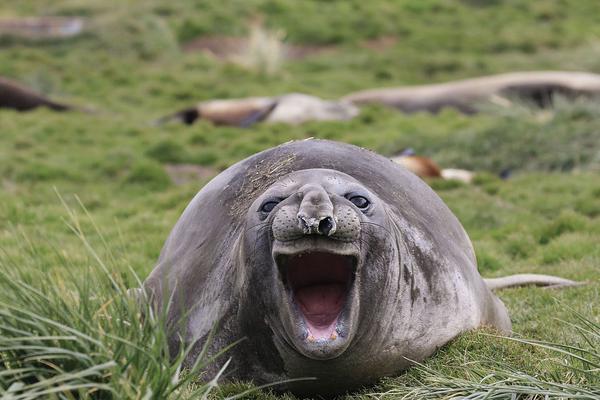Emperor penguins are asexual eroticismexcellent divers, and scientists in Antarctica have clocked the world's longest dive from the aquatic bird.
The tracked penguins managed to complete underwater dives as long as 32.2 minutes, eclipsing the previous record of 27.6 minutes. On average, emperor penguins dive for about three to six minutes.
SEE ALSO: Arctic sea ice is loaded with plastic litter from cigarettes and paintOn average, the penguins dove 90.2 metres (98.64 yards) deep, but sometimes went as deep as 450 metres (492 yards). More than 96,000 dives were recorded, with most tags attached for at least six months.
The research was compiled by Kim Goetz, a marine ecologist at New Zealand's National Institute of Water and Atmospheric Research, and published in a paper.
Goetz tagged 20 penguins at Antarctica's Cape Colbeck in 2013 to conduct her findings, but it nearly didn't go to plan because of her team's late arrival.
"Our original goal was to tag breeding penguins at Cape Colbeck after their annual moult at the end of January. But because the voyage was delayed we didn’t get there until early March," she said in a statement.
"We didn't expect penguins to still be there and thought we would have to locate them on the pack ice which was going to be more difficult."
Fortunately, there managed to be a handful of adult penguins still hanging around at Cape Colbeck which were quickly tagged. The problem though, was these animals weren't breeding penguins as anticipated.
"If they were breeders, their tracks would have been a lot shorter and they would have returned to the breeding ground by early June but they didn’t. They kept foraging because they had no reason to go back," she said.
But that allowed Goetz and her team to survey the behaviour of adult emperor penguins after they leave breeding colonies, something which is little known about.
It allowed the team to discover just how far these penguins go, heading into deeper waters to catch fish. Researchers thought they survived on krill, which lurks in shallower waters.
Goetz said the findings helped researchers understand how emperor penguins survive in the most extreme environmental conditions, which happens after they leave their breeding colonies in mid-December to mid-January.
"That’s why understanding their entire life cycle, especially when birds are not restrained by chick-rearing duties, is critical to predicting how emperor penguins might respond to environmental changes," she said.
(Editor: {typename type="name"/})
 Nvidia's Digits is a tiny AI supercomputer for your desk
Nvidia's Digits is a tiny AI supercomputer for your desk
 New Heathrow runway nixed because of climate change
New Heathrow runway nixed because of climate change
 Report: Apple, Amazon, and Google use supply chain factories that rely on forced labor
Report: Apple, Amazon, and Google use supply chain factories that rely on forced labor
 Prince Harry opens up
Prince Harry opens up
 Best air purifier deal: Save $300 on the Dyson HEPA Big + Quiet air purifier
Best air purifier deal: Save $300 on the Dyson HEPA Big + Quiet air purifier
Best Apple Pencil Pro deal: Save $30 at Best Buy
 SAVE $30:As of Jan. 17, the Apple Pencil Pro is discounted to $99 at Best Buy. This is $30 off its l
...[Details]
SAVE $30:As of Jan. 17, the Apple Pencil Pro is discounted to $99 at Best Buy. This is $30 off its l
...[Details]
White nationalist caught assaulting protester on viral video blames President Trump in court
 A white nationalist caught shoving a black protestor at a Trump rally has a creative defense for why
...[Details]
A white nationalist caught shoving a black protestor at a Trump rally has a creative defense for why
...[Details]
SETI no longer needs your idle computer to search for alien life
 It's always nice to feel useful, even if not much comes of it in the end. The millions of people who
...[Details]
It's always nice to feel useful, even if not much comes of it in the end. The millions of people who
...[Details]
West Virginia dumps controversial voting app before primary
 West Virginia won't use a controversial voting app during its primary on May 12. The state originall
...[Details]
West Virginia won't use a controversial voting app during its primary on May 12. The state originall
...[Details]
Get a free soundbar when you buy a 34
 SAVE $149.99:As of Jan. 23, buy the LG 34-inch UltraWide WQHD HDR curved monitor for $279.99 (normal
...[Details]
SAVE $149.99:As of Jan. 23, buy the LG 34-inch UltraWide WQHD HDR curved monitor for $279.99 (normal
...[Details]
All the best signs from Tax Day protests against President Trump
 On April 15 — the Saturday before tax filings were due — thousands of Americans across t
...[Details]
On April 15 — the Saturday before tax filings were due — thousands of Americans across t
...[Details]
Netflix's 'Love Is Blind' sets reunion special
 In true reality romance fashion, Love Is Blindis getting a reunion. On Wednesday, Netflix announced
...[Details]
In true reality romance fashion, Love Is Blindis getting a reunion. On Wednesday, Netflix announced
...[Details]
Uber and Lyft have coronavirus tips for drivers, but not health insurance or paid sick days
 Uber and Lyft are giving drivers tips on how to the avoid the coronavirus. What drivers aren't getti
...[Details]
Uber and Lyft are giving drivers tips on how to the avoid the coronavirus. What drivers aren't getti
...[Details]
Notre Dame vs. Georgia football livestreams: kickoff time, streaming deals, and more
 Wondering how to watch college football this season? Here are your best options: Best
...[Details]
Wondering how to watch college football this season? Here are your best options: Best
...[Details]
 Prince Harry has spoken candidly in a rare interview about being near "complete breakdown" whilst de
...[Details]
Prince Harry has spoken candidly in a rare interview about being near "complete breakdown" whilst de
...[Details]
Apple is advertising on Elon Musk's X again

The NSA's $100 million call surveillance program was a big flop

接受PR>=1、BR>=1,流量相当,内容相关类链接。